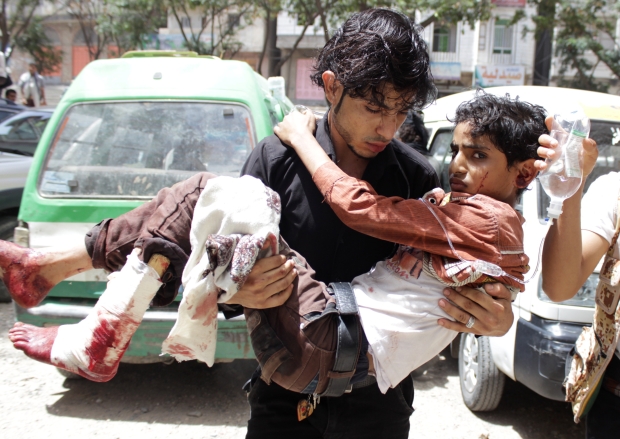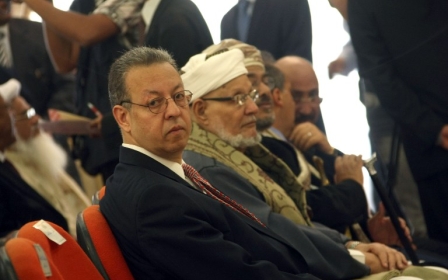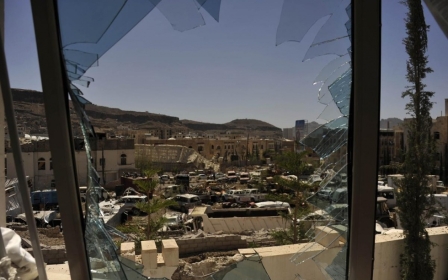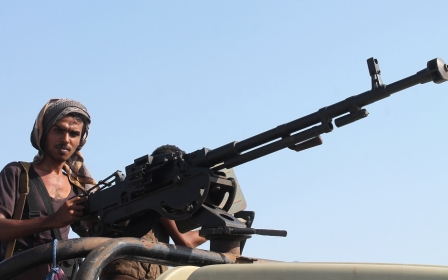Yemen victims of Saudi-led attacks suffer as casualties mount
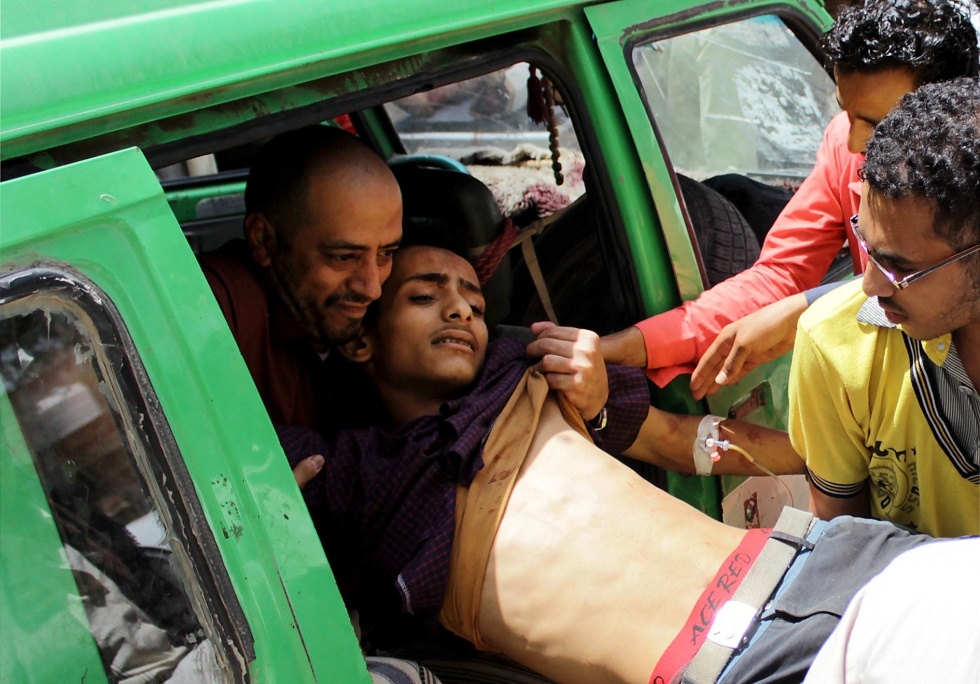
SANAA - Al-Zubairi street in Sanaa is close to the hospital where Ahmed Futaini had taken his son for treatment. As Futaini, a slight man in his mid-40s, walked down the street, he held his son’s severed arm tightly.
He was moving quickly, but he vowed that he would not let go and would not rest until he found a safe spot where he could bury the arm.
"Do you know a proper place where I can bury my son's arm?" Futaini asked people as they came, went and waited at the hospital burn centre, but many seemed oblivious to the request.
Everyone was too busy dealing with their own relatives and trying to navigate amidst the carnage, but Futaini remained determined that he would find a spot for the severed limb that only a few hours ago had belonged to 14-year-old Saleh.
A few hours earlier, the pair had managed to make it to the hospital. In an attempt to save the arm, Futaini had wrapped it in a black plastic bag as his son screamed out in pain. By the time they managed to see a doctor though, it was too late. The surgeon would eventually have to amputate Saleh’s arm from above the elbow.
New MEE newsletter: Jerusalem Dispatch
Sign up to get the latest insights and analysis on Israel-Palestine, alongside Turkey Unpacked and other MEE newsletters
No medicine worked and as soon as the anesthesia began to wear off, Saleh’s agony returned. The father tried his best to hold back tears as he watched his son writhe in pain.
"It is the fate Allah has decided; we should be patient enough to be rewarded by God,” Futaini said.
But not all can find comfort in religion in these difficult times.
Saleh's uncle, who was sitting beside his bed, had little patience for such words.
"This is not Allah's fate but the politicians who tried to kill our son,” said the uncle. “What they have actually done is make him live with permanent disability."
Saleh was among dozens of others who were injured in al-Mazraq camp in the Hajjah province north of the capital on 30 March, when a missile struck, allegedly fired by the Saudi-led coalition.
The missile hit the refugee camp, killing 40 internally displaced Yemenis who had fled the Houthi stronghold of Saada and Amran due to the protracted conflict between the Houthis and former president Ali Abdullah Saleh that began more than five years ago.
Saleh stepped down in 2012 after months of protests against his rule, but he and his son Ahmed Ali are believed to be regrouping. Last year, they seemingly began backing the Houthis and have since joined forces to help oust President Abd Rabbuh Mansour Hadi.
The violence, however, has escalated this year as the Houthis moved to extend their control of the capital and began pushing further south, almost taking the southern city of Aden. Their rapid advancement prompted Saudi Arabia to form a coalition aimed at rolling back their gains.
The boy, Saleh, is one of more than 115 children who according to the UN have been caught up in the fighting.
He was not living at the camp, but he was collecting plastic for recycling nearby when the strike hit. Before the attack, his hands were a source of income for his family. For more than two years, Saleh was shouldering the financial burden by providing food and basic supplies, but it’s unlikely he will ever get back to work.
“How will he manage with one hand now?” Futaini asked, breaking into tears.
Staring into the walls blankly, Futaini was angry, clueless and unsure where to address his grievances.
The Saudi-led coalition spokesperson Ahmed Aseri denied the strike targeted the camp and instead accused the Houthis.
With both sides denying responsibility for the attack, Futaini’s ultimate concern is trying to find some medical and financial assistance for his son.
"What I care about the most now is that my son will recover soon," Futaini told Middle East Eye.
"But I do not know what his mother's response will be when she sees her son’s arm amputated. I think she will faint with a shock.” Futaini said.
Saleh waited in the hospital for three days, but after the medicine given to him did not work, a surgeon decided to amputate his arm.
'I need them to treat my son'
Meanwhile, 20-year-old Ibrahim Othman looked frail laying down beside Saleh in the same room. He was among the victims of a missile attack that hit a neighbourhood in the Yareem district of the Ibb governorate a day after al-Mazraq camp was struck.
Ibrahim’s mother was crying over her son's serious injuries.
"I have no one but Ibrahim who used to work, eking out the food for us," his mother Kolthoom said.
She said she had heard about the explosion in Yareem while she was in the al-Sada district some 10 miles away. She feared for her son’s life - he had been in Yareem, where he works as a carpenter, for the past three days.
Kolthoom immediately set forth to Yareem to see if her son was safe. "I realised that something went wrong as his mobile was off," she added.
She afterwards was told that her son might have been one of those transported to Sanaa to receive treatment in the hospital.
At the burn and cosmetic centre of the state-run al-Jomhori hospital, Kolthoom found her son with serious burns and injuries.
"When I looked at him, I did not believe that he is Ibrahim, my son; I thought he is someone else, but as he called out my name, I burst into tears falling down unable to give any word for couple of hours."
But after looking at Saleh’s condition, Ibrahim’s mother felt slightly better about her own son’s injuries.
The burn and cosmetic centre at the hospital was overflowing with patients due to unremitting airstrikes by the Saudi-led coalition and its Gulf allies.
Saleh al-Dahiani, the manager of the burn and cosmetic section, told MEE that every day since the coalition launched its first aerial strikes on 26 March, the centre has been receiving burn victims, with wounds ranging from first- to third-degree burns
The majority of the patients admitted suffer from third-degree burns, according to al-Dahiani.
The centre has 40 beds, but the current number of burn patients far outstretch section's capacity.
"We have been forced not to do proper surgeries for people with first- and second-degree burns, making the priority for the people with third-degree burns so as to save their lives," al-Dahinai added.
As of now, al-Dahinai said, four of the patients in the centre have died of their wounds, a figure that is likely to increase due to the lack of well-equipped intensive care units and life-saving medicines.
With only two centres for burn and cosmetic injuries – one at al-Jomhori in Sanaa and another at the state-run al-Thoura hospital in Taiz, victims are left with few options.
On 22 April, the Ministry of Heath issued a press release with an updated death toll and casualties resulting from the Saudi-led coalition strikes. It said that the death toll among civilians stood at 951, with 3,311 injured.
Tamim al-Shami, the spokesperson of the Ministry of Health, said in a news conference that the death toll among children had reached 134, with 401 injured, whilst the death toll of the women reached 95, with 225 injured.
Aerial strikes launched by the coalition targeted nine hospitals in the Sada, Hajja, Marib, Sanaa and al-Dalea governorates, al-Shami said.
He confirmed that more than 95 percent of the foreign medical staff were evacuated, and that this has negatively affected hospital services.
The World Health Organisation (WHO) in Yemen had already warned about the imminent breakdown of the medical care due to the lack of medicines, medical supplies and recurrent electricity outages.
As a result, many injured people were assured that they would be transported abroad to receive the appropriate treatment, but as of now the promise has not been met.
Ibrahim’s mother heard about the promise and brought her other son Mohammed from the village to accompany his brother during the medical journey abroad.
"Thank God, they will transport my son abroad to treat him but I do not know when and where,” she said, waiting anxiously.
Ibrahim's mother dreams of seeing her son walking again once he heals from his injuries.
"I have no one but Ibrahim; I need to see him stand on his feet smiling like before,” she told MEE, sobbing.
"I do not want someone to pay me money, I need them to treat my son," she said.
When asked who she expected would reimburse her for her son's medical treatment, she said: "It's a war and I do not know who is in charge of reimbursing my son and us for his injuries; all what I care about right now is my son's health."
Ibrahim never showed his face to people who dropped by to see him; he covered his face with the blanket. He also did not want to speak to people.
"He feels ashamed when he meets people with his face burned and deformed. He instead asked me to reply the people," his mother told MEE.
Al-Dahinai said that the Ministry of Heath promised to transport serious cases abroad as soon as possible.
Abdualaziz al-Badani, a prominent Yemeni actor whose brother died as a result of the Yareem explosion, told MEE: " I do not know where I can go to complain about my brother's injuries."
His brother Abduallah was the driver of a gas van that exploded in Yareem after the missile hit the area where he was passing.
Abduallah suffered from third-degree burns and died nine days after his admission to the burn and cosmetics centre in al-Jomhori hospital.
His brother Abdualaziz became crazy after he lost Abduallah, unsure how to look after his brother’s wife and five kids, who are without a father now.
"When I look at my brother's kids, I feel ashamed about whether or not I will able to raise them. They became victims of a cursed war.”
Middle East Eye delivers independent and unrivalled coverage and analysis of the Middle East, North Africa and beyond. To learn more about republishing this content and the associated fees, please fill out this form. More about MEE can be found here.


